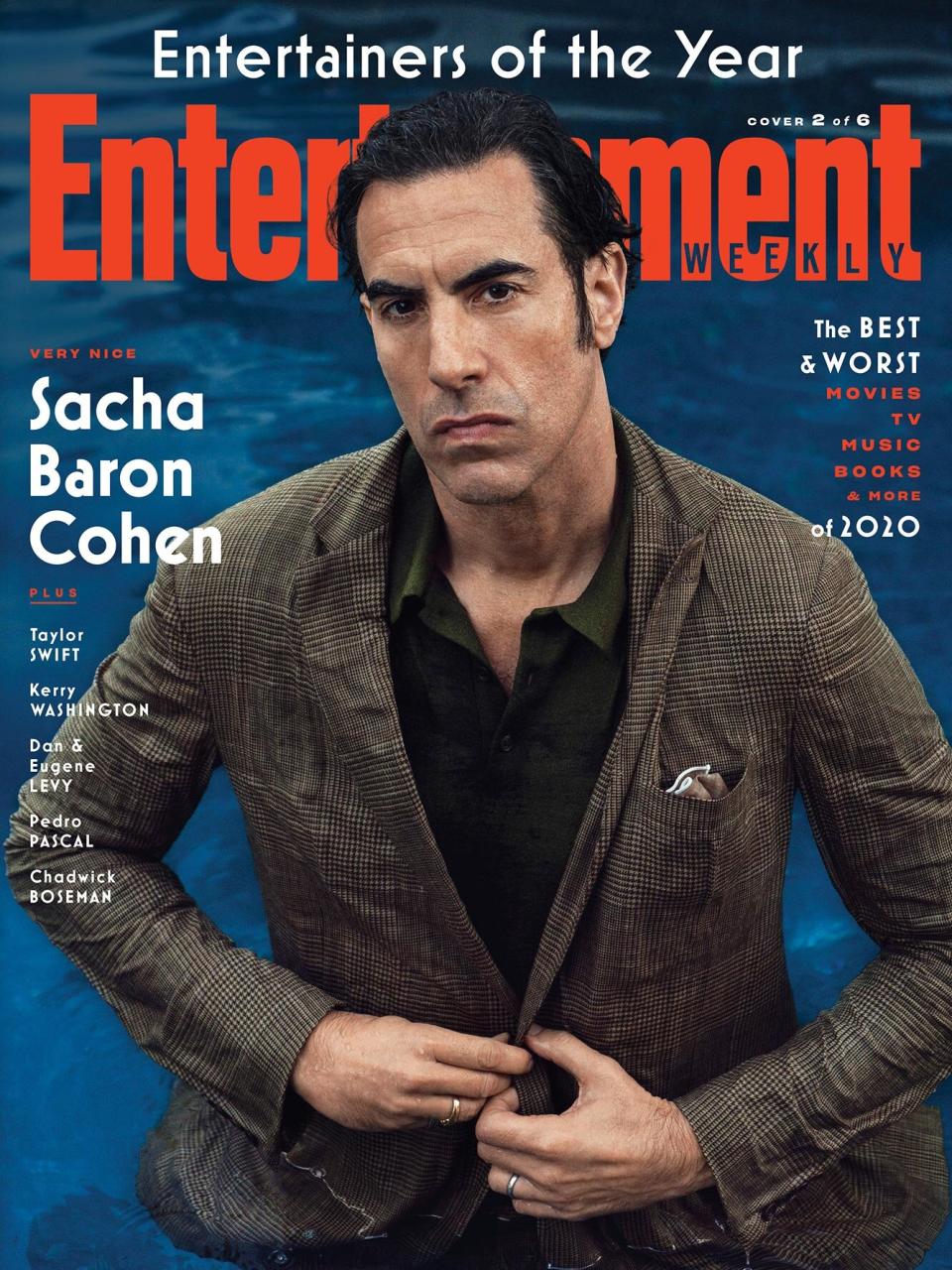For Sacha Baron Cohen, his Borat return and Trial of the Chicago 7 role had a core idea in common

- Oops!Something went wrong.Please try again later.
- Oops!Something went wrong.Please try again later.
- Oops!Something went wrong.Please try again later.
Nolwen Cifuentes for EW
Based solely on his two-film output, 2020 was a very productive year for Sacha Baron Cohen. “Normally I come out with one every four years, so it’s eight times my normal,” quips the 49-year-old star of Borat Subsequent Moviefilm and The Trial of the Chicago 7. “I’m a very reluctant actor, and I can be quite lazy.” He also felt it was time to stop hiding behind characters and make his true voice heard. “Too much was on the line,” says the London-born writer-comedian of his social media protest/anti-hate campaign. “We could see the end of democracy in America.”
ENTERTAINMENT WEEKLY: When did you decide to reprise your mockumentary role as Borat Sagdiyev?
SACHA BARON COHEN: When Donald Trump got elected president, I felt it was time to go undercover again. Borat is effective because he is essentially 20 percent more extreme than Trump. He’s 20 percent more misogynistic. He’s 20 percent more supportive of white supremacists and 20 percent more enthusiastic about caging children. I mean, maybe the only thing Borat’s less enthusiastic about than Trump is having to pay women for sex.
2020 Entertainers of the Year: Sacha Baron Cohen
Sacha Baron Cohen reflects on his year, playing Abbe Hoffman in 'The Trial of the Chicago 7,' his 'Borat' sequel, and the U.S. election.
Do you think the movie influenced the outcome of the presidential election?
What I believe it may have done was to reduce the impact of the Republicans’ October surprise that was being delivered by the president’s lawyer. Remember, the movie was released on Amazon prior to the final presidential debate. And the image of Rudy Giuliani on the bed with his hand down his trousers was circulating the day before that. So did it slightly dampen the impact of his October surprise? I hope so. I would say comedy and satire humbled the powerful. That’s what I tried to do in Borat.
What was it like to get the call from Aaron Sorkin to play Abbie Hoffman in Netflix’s The Trial of the Chicago 7?
I’ve got to be completely honest: I made the call originally in 2007 to Steven Spielberg. I heard he was making a movie about the Chicago 7, and I had been rather obsessed with Abbie since my early 20s. I went through a long process with Steven before he gave me the part. Unfortunately, that project was tragically destroyed by the deaths of two of the cast members, Heath Ledger and Philip Seymour Hoffman. The final death knell was the writers’ strike. I stayed with the project for 13 years. These were issues I cared about that I didn’t want to let go of. When Aaron took the project, I pitched myself again.
Abbie had such terrific one-liners, especially during the courtroom scenes.
A lot of those lines were actually taken from the court transcript. Abbie realized the whole trial was political, and his aim was not to be declared innocent and avoid jail. It was to convince America the war in Vietnam was completely immoral. He knew that they were going to get attention every day. It worked.

Nolwen Cifuentes for EW
Why did you launch your Stop Hate for Profit campaign?
The social media companies operated in a way that would ultimately lead to the destruction of democracy. Democracy relies on shared truths or facts. Autocracy relies on the population believing in shared lies. So I thought it was time to forget about my career and just say what I thought. If we could put pressure on the social media companies to stop spreading conspiracy theories, it would be harder for the Republicans to win.
When you began your career, was your goal to make people laugh and to protect democracy at the same time?
My aim was to make people laugh, but also use comedy to expose hate and prejudice. When I started doing this form of comedy in the mid ’90s, democracy wasn’t under threat, and I naively thought it never would be. When a demagogue took power in the United States, that became my overriding mission.
For more on our Entertainers of the Year and Best & Worst of 2020, order the January issue of Entertainment Weekly or find it on newsstands beginning Dec. 18. Don’t forget to subscribe for more exclusive interviews and photos, only in EW.
Related content:
